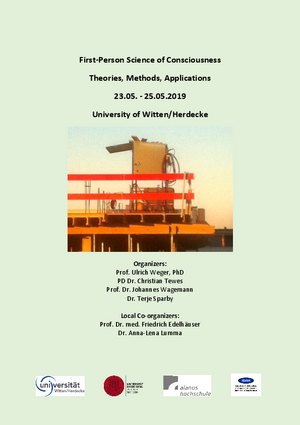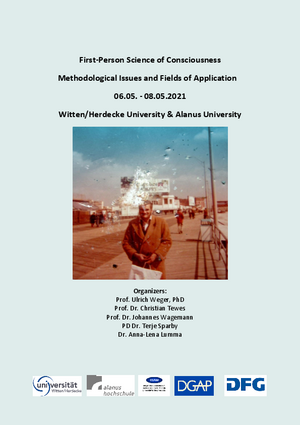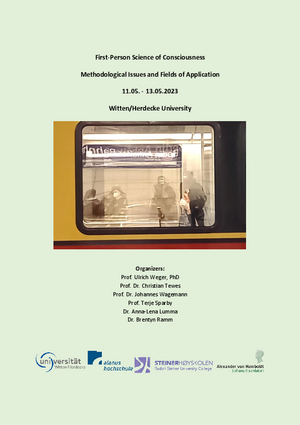Conference 2019

First-Person Science of Consciousness: Theories, Methods, Applications – May 23-25, 2019 at Witten/Herdecke University, Germany
The idea of directing attention toward one’s own mental acts and their contents exemplifies the ancient philosophical principal of „know thyself“ in the context of our modern time. For philosophers like Brentano or Husserl, the observation of often unnoticed pre-reflexive mental phenomena opened up a field for investigating the structure and dynamics of the mind „from within“. Corresponding theories and methods were suggested to provide a direct access to the most fundamental aspects of reality – the self, the structure of consciousness, the basic categories of reality, and their logical and ontological foundations.
The various attempts in the early 1900s at establishing a systematic form of introspection in psychology – for instance, in the work of Wundt and Titchener – are regarded as having failed. And though the work of Brentano and Husserl has been influential, actual introspective or phenomenological studies are rare today and typically met with skepticism. Similarly, methods such as phenomenological psychology and micro-phenomenology exist within a niche and are not yet widely regarded as reliable first-person approaches. Hence, a first-person science of consciousness is currently not part of the established forms of systematic, scientific procedure. This is striking, given the fact that first-person observation is implicitly involved in all forms of psychological research. Every psychologist makes direct or indirect use of introspection, for instance, when operationalizing psychological phenomena for further research. One can also argue that precise sense-based observation is inherently introspective, in that it involves mental faculties such as attention and memory.
Furthermore, we take for granted that science benefits from developing ever more precise instruments for investigating natural phenomena. Why should we not develop ever more precise methods for studying consciousness and the introspective activity that underlies scientific conduct? Until we have good methods for gathering accurate, reliable and rich descriptions of mental events and processes, psychology and related disciplines will arguably lack a strong foundation.
Conference 2021

First-Person Science of Consciousness – Methodological Issues and Fields of Application – May 6-8, 2021 at Witten/Herdecke University, Germany
With the recent re-appearance of consciousness as a field of research in the cognitive sciences, different methods of first-person enquiry have been developed. In the field of “micro-phenomenology”, for example, various techniques are now available to invoke first-person experiences and to analyze their structural content. The same is true with regard to the “descriptive experience sampling method”, the psychotherapeutic method of “focusing”, or the “protocol analysis” approach – to name only a few. Each of these methods explores subjects’ lived experiences. This does not mean, however, that there are no controversies concerning the structure and justification of the respective methods. A number of important issues remain unresolved. For instance, should a first-person science seek to inquire into pre-reflective or “pristine experiences” of mental processes? Are reflexivity and the application of concepts essential ingredients of first-person descriptions? How do we assess the process of retrospection, i.e. the temporal gap between a former experience and its re-evocation? Finally, in what way do first-person methods have to adapt to specific disciplines as diverse as psychology, psychotherapy, mathematics, or pedagogy?
Conference 2023

First-Person Science of Consciousness – Methodological Potentials, Challenges and Developmental Perspectives – May 11-13, 2023 in Witten, Germany
The first-person perspective has had a checkered fate in the development of modern psychology, philosophy, and cognitive science. While introspection was a widely used but neither fully established nor unchallenged method at the beginning of the 20th century, it was soon supplanted by behaviorism and analytic philosophy in favor of more „objective“ approaches. One reason for the decline was the challenge to make introspective methods and results accessible for intersubjective review and confirmation. But even conventional methods indirectly draw upon introspection, both in empirical and theoretical contexts. It hence apparently cannot be fully eliminated in the study of human consciousness. However, in the last two decades the scope of introspective research was broadened by linking it with rigorous methods of intersubjective validation. More recently, there have been attempts to re-integrate the first-person perspective into the mind sciences. For that reason, the exploration of the phenomenal experiences of the subject now seems a more natural fit in the (psychological) toolbox; as a matter of fact, a whole spectrum of methods explicitly prioritizing the first-person perspective has emerged that have already proven their worth in a range of studies.
Against this background it seems legitimate to ask which directions the outlined development might take; what strengthens and differentiates the first-person perspective even further? And what potential may first-person approaches have for science and society-related issues in more general terms. As with many developments in science, an increasing diversity and even competition has arisen in the realm of first-person methods and their validation, which is sometimes challenging. To give an example, it is still an important research question as to how the temporal gap between first-person experiences and their (e.g., verbal) expression might be bridged.
Is it legitimate to evocate (memorize or re-enact) former experiences or should, if possible, the process of verbalizing subjective experiences occur simultaneously? Moreover, a classification is required that documents the possibilities and limitations of the various sub-approaches. Also, from the outside perspective of mainstream research, an overview and classification of existing first-person methods would be desirable, so that they can be better incorporated into the standard repertoire of the consciousness sciences. Systematization may begin, for example, with an examination of the extent to which first-person methods can contribute to ideographic or nomothetic research approaches. Should they aim primarily at exhaustively fine-grained representations of individual lived experience, or should they also serve to discover and substantiate universal structures and general laws? This leads to the question whether and how first -person methods can best be integrated into mixed methods approaches, for example into data collection for triangulation, data analysis, and theory building. To what extent can first-person approaches be combined with established qualitative and quantitative approaches?
And finally: Can we expect a realignment of the mind sciences and perhaps even an impact on science policy and other dimensions of social development from a stronger inclusion of first-person methods? One example concerns the exploration of free will. It has been argued by proponents of free will that its foundation and development depend on introspective access to one’s own mental states in concept formation, critical reflection, deliberation, and decision-making activities. One can ask then how a methodologically assisted access to such mental actions and their exploration might affect the course of social processes and science policy in its ethical foundation and critical justification itself.



